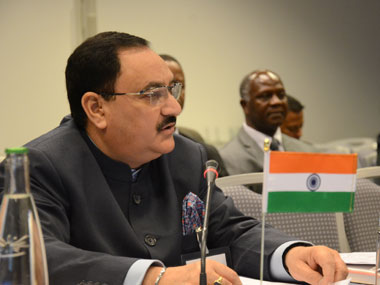The Union Ministry of Health has banned 82 medical colleges — 70 private and 12 government-run — from accepting students for the academic session 2018-19, according to several media reports. The latest order means more than 10,000 seats out of the total 64,000 MBBS seats normally available will be blocked. This comes after the Central Board of Secondary Education (CBSE) on Monday announced
the NEET 2018 results bringing an end to the wait of almost 16 lakh students. [caption id=“attachment_3007742” align=“alignleft” width=“380”] File image of the Union Health Minister JP Nadda. PIB[/caption] According to India Today, the JP Nadda-led ministry has also
rejected the proposal to approve 68 new medical colleges out of which four are in Bihar and two in West Bengal. These colleges would have added 9,000 MBBS seats for the 2018-19 academic session.“People want to create things (medical colleges) without realising what the colleges require,” a member of the MCI’s academic committee was quoted as saying by The Telegraph. The Union cabinet had in February approved plans to set up 24 new government-funded medical colleges by 2021-22, in addition to 58 medical colleges that were to be established and attached to district hospitals by 2019. Of the 68 denied permission to come up, 31 are government colleges and 37 private colleges. The decisions, announced on Thursday, were based on recommendations from the Medical Council of India (MCI), the apex regulatory body for medical education that assesses whether colleges have the required infrastructure, faculty and number of patients. The regulators cited “deficiencies” in the colleges and highlighted how a scarcity of resources was challenging India’s ambition to expand medical education. The Vardhman Institute, one of the 82 colleges, has already trained five batches of MBBS students, and the first batch is undergoing internship. “We are hoping to sail through this. We need firm decisions from the government to get faculty in colleges like ours,” Das said, as per the report. “We have adequate infrastructure and faculty, and we had more than the required volume of patients in the hospital, but the (MCI) inspection report claimed we lacked enough patients”, an official from another of the banned colleges told The Telegraph. The health ministry has also rejected proposals from nine medical colleges - four government and five private - to increase their MBBS seats by 50 to 100 each. In another announcement on Thursday, the ministry barred 31 medical colleges from either starting new super speciality courses — such as those in cardiology, nephrology, plastic surgery — or expanding seats in existing courses. According to a
News18 report, the list included well known government colleges such as Lucknow’s King George Medical College University, stopped from expanding or starting MCh (Plastic & Reconstructive Surgery) and MCh (Neurosurgery), Christian Medical College Vellore, disallowed courses in MCh (Reproductive Medicine& Surgery), DM (Nephrology), DM (Pediatrics Neurology), Institute of Liver and Biliary Sciences, New Delhi, disallowed DM (Hepatology), MCh (HPB Surgery) and DM (Pediatrics Hepatology) etc. The loss of seats is bound to hit the lakhs of aspiring medical students, already fighting for seats that are not nearly enough in number to accommodate all of them. In the 2018 Union Budget, Health Minister JP Nadda had announced efforts to upgrade and add to the health infrastructure, including 15 super speciality facilities at 15 government colleges and 58 new medical colleges attached with district hospitals.
The Union health ministry has banned 82 medical colleges, 70 private and 12 government, from accepting students for the academic session 2018-19
Advertisement
End of Article


)

)
)
)
)
)
)
)
)



